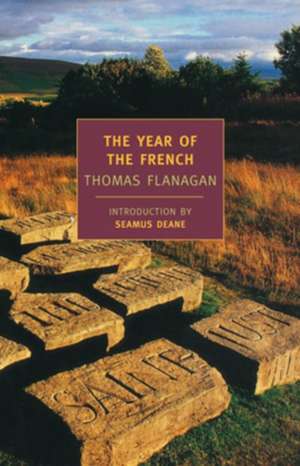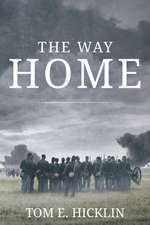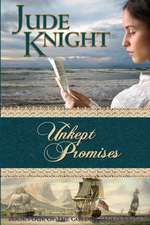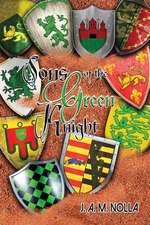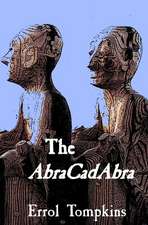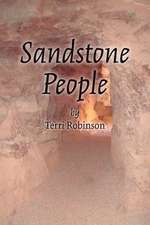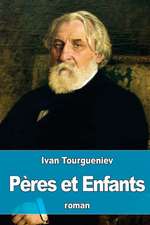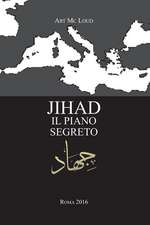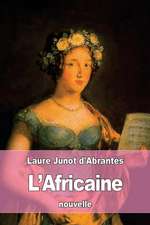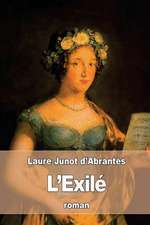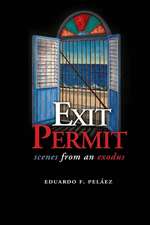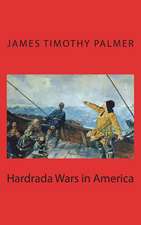The Year of the French: New York Review Books Classics
Autor Thomas Flanaganen Limba Engleză Paperback – 14 ian 2004
Vezi toate premiile Carte premiată
Very few books succeed in registering the sudden terrible impact of historical events; Thomas Flanagan's is one. Subtly conceived, masterfully paced, with a wide and memorable cast of characters, The Year of the French brings to life peasants and landlords, Protestants and Catholics, along with old and abiding questions of secular and religious commitments, empire, occupation, and rebellion. It is quite simply a great historical novel.
Named the most distinguished work of fiction in 1979 by the National Book Critics' Circle.
Din seria New York Review Books Classics
-
 Preț: 88.86 lei
Preț: 88.86 lei -
 Preț: 99.24 lei
Preț: 99.24 lei - 16%
 Preț: 79.25 lei
Preț: 79.25 lei -
 Preț: 77.73 lei
Preț: 77.73 lei -
 Preț: 124.55 lei
Preț: 124.55 lei -
 Preț: 98.73 lei
Preț: 98.73 lei -
 Preț: 83.30 lei
Preț: 83.30 lei -
 Preț: 182.08 lei
Preț: 182.08 lei -
 Preț: 102.47 lei
Preț: 102.47 lei -
 Preț: 76.46 lei
Preț: 76.46 lei -
 Preț: 174.64 lei
Preț: 174.64 lei -
 Preț: 110.73 lei
Preț: 110.73 lei -
 Preț: 119.57 lei
Preț: 119.57 lei -
 Preț: 94.01 lei
Preț: 94.01 lei -
 Preț: 119.36 lei
Preț: 119.36 lei -
 Preț: 101.24 lei
Preț: 101.24 lei -
 Preț: 85.97 lei
Preț: 85.97 lei -
 Preț: 142.67 lei
Preț: 142.67 lei -
 Preț: 102.25 lei
Preț: 102.25 lei -
 Preț: 103.29 lei
Preț: 103.29 lei -
 Preț: 113.30 lei
Preț: 113.30 lei -
 Preț: 100.59 lei
Preț: 100.59 lei -
 Preț: 126.41 lei
Preț: 126.41 lei -
 Preț: 107.40 lei
Preț: 107.40 lei -
 Preț: 174.03 lei
Preț: 174.03 lei -
 Preț: 107.44 lei
Preț: 107.44 lei -
 Preț: 89.27 lei
Preț: 89.27 lei -
 Preț: 85.34 lei
Preț: 85.34 lei -
 Preț: 90.09 lei
Preț: 90.09 lei -
 Preț: 96.42 lei
Preț: 96.42 lei -
 Preț: 99.60 lei
Preț: 99.60 lei -
 Preț: 85.16 lei
Preț: 85.16 lei -
 Preț: 127.42 lei
Preț: 127.42 lei -
 Preț: 87.20 lei
Preț: 87.20 lei -
 Preț: 136.91 lei
Preț: 136.91 lei -
 Preț: 105.17 lei
Preț: 105.17 lei -
 Preț: 161.86 lei
Preț: 161.86 lei -
 Preț: 90.72 lei
Preț: 90.72 lei -
 Preț: 88.86 lei
Preț: 88.86 lei -
 Preț: 94.83 lei
Preț: 94.83 lei -
 Preț: 123.08 lei
Preț: 123.08 lei -
 Preț: 133.18 lei
Preț: 133.18 lei -
 Preț: 95.45 lei
Preț: 95.45 lei -
 Preț: 97.50 lei
Preț: 97.50 lei -
 Preț: 81.66 lei
Preț: 81.66 lei -
 Preț: 111.96 lei
Preț: 111.96 lei -
 Preț: 100.18 lei
Preț: 100.18 lei -
 Preț: 75.23 lei
Preț: 75.23 lei -
 Preț: 91.13 lei
Preț: 91.13 lei -
 Preț: 94.86 lei
Preț: 94.86 lei
Preț: 134.64 lei
Nou
Puncte Express: 202
Preț estimativ în valută:
25.77€ • 26.87$ • 21.41£
25.77€ • 26.87$ • 21.41£
Carte disponibilă
Livrare economică 28 februarie-14 martie
Livrare express 13-19 februarie pentru 33.33 lei
Preluare comenzi: 021 569.72.76
Specificații
ISBN-13: 9781590171080
ISBN-10: 159017108X
Pagini: 544
Ilustrații: Illustrations
Dimensiuni: 136 x 209 x 29 mm
Greutate: 0.57 kg
Editura: NEW YORK REVIEW OF BOOKS
Seria New York Review Books Classics
Locul publicării:United States
ISBN-10: 159017108X
Pagini: 544
Ilustrații: Illustrations
Dimensiuni: 136 x 209 x 29 mm
Greutate: 0.57 kg
Editura: NEW YORK REVIEW OF BOOKS
Seria New York Review Books Classics
Locul publicării:United States
Notă biografică
Thomas Flanagan (1923–2002), the grandson of Irish immigrants, grew up in Greenwich, Connecticut, where he ran the school newspaper with his friend Truman Capote. Flanagan attended Amherst College (with a two-year hiatus to serve in the Pacific Fleet) and earned his Ph.D. from Columbia University, where he studied under Lionel Trilling while also writing stories for Ellery Queen’s Mystery Magazine. In 1959, he published an important scholarly work, The Irish Novelists, 1800 to 1850, and the next year he moved to Berkeley, where he was to teach English and Irish literature at the University of California for many years. In 1978 he took up a post at the State University of New York at Stonybrook, from which he retired in 1996. Flanagan and his wife Jean made annual trips to Ireland, where he struck up friendships with many writers, including Benedict Kiely and Seamus Heaney, whom he in turn helped bring to the United States. His intimate knowledge of Ireland’s history and literature also helped to inspire his trilogy of historical novels, starting with The Year of the French (1979, winner of the National Critics’ Circle award for fiction) and continuing with The Tenants of Time (1988) and The End of the Hunt (1994). Flanagan was a frequent contributor to many publications, including The New York Review of Books, The New York Times, and The Kenyon Review. A collection of his essays, There You Are: Writing on Irish and American Literature and History, is also published by New York Review Books.
Seamus Deane, formerly Professor of English and American Literature at University College, Dublin, is now Keough Professor of Irish Studies at the University of Notre Dame. Among his books are Selected Poems, Celtic Revivals, Strange Country: Ireland and Modernity, and the novel Reading in the Dark. He was General Editor of the three-volume Field Day Anthology of Irish Writing.
Seamus Deane, formerly Professor of English and American Literature at University College, Dublin, is now Keough Professor of Irish Studies at the University of Notre Dame. Among his books are Selected Poems, Celtic Revivals, Strange Country: Ireland and Modernity, and the novel Reading in the Dark. He was General Editor of the three-volume Field Day Anthology of Irish Writing.
Recenzii
"...a circumspect and grippingly authentic account that stands as a stark warning against the romanticisation of torrid times. The result is a classic of historical fiction” —The Times (London)
“I recall the excitement when this book was published in the late 1970's - and then discovered (not always the case) that the book merited it. Flanagan, an American history professor of Irish descent, pulled off a substantial coup in that he brought a historian's training to bear upon a romantic moment, the period when the French landed in the west of Ireland in 1798 and all Ireland thought liberation was at hand. His research never lies around the novel in pools, it stains the entire fabric, so that when his character's point of view is emerging from a dispossessed farmer's clay hovel or a small town merchant's table in the local hotel, we smell them - their clothes, their breath and (this is Ireland after all) their politics.” —Frank Delaney, The Guardian
"A masterwork of historical fiction." —The Philadelphia Inquirer
"The book's wide-ranging scope and erudition are reminiscent of Tolstoy." — Chicago Tribune
"This deserves every major literary prize." — Publishers Weekly
“In his prodigious first novel, Thomas Flanagan grants this historic episode a new and panoramic life....[a] thoughtful, graceful elegy.” — Mayo Mohs, Time
“Such a brutal and pathetic story would alone have sufficed to make this book absorbing, but Flanagan has much more on his mind. He means to create not only a plausible sense of place and character, and an accurate account of evens, but to recreate, from barroom to manor hall, the entire intellectual and emotional climate of the time....not only a serious book...but a distinguished one as well.” — Peter S. Prescott, Newsweek
“a rich and complex narrative...[an] extraordinary achievement" — George Garrett, The New York Times
"I haven't so enjoyed a historical novel since The Charterhouse of Parma and War and Peace." — John Leonard, The New York Times.
“handsomely written...[a] splendid novel.” — Denis Donogue, The New York Review of Books
"Thomas Flanagan was one of irish-America's—one of the literary world's—great treasures. he wrote in flowing, baroque sentences that defied literary conventions born of minimalism and the modern attention span. His novels had texture and context, and were—astonishingly—critical successes and popular bestsellers." —Terry Golway, The Irish Echo
“I recall the excitement when this book was published in the late 1970's - and then discovered (not always the case) that the book merited it. Flanagan, an American history professor of Irish descent, pulled off a substantial coup in that he brought a historian's training to bear upon a romantic moment, the period when the French landed in the west of Ireland in 1798 and all Ireland thought liberation was at hand. His research never lies around the novel in pools, it stains the entire fabric, so that when his character's point of view is emerging from a dispossessed farmer's clay hovel or a small town merchant's table in the local hotel, we smell them - their clothes, their breath and (this is Ireland after all) their politics.” —Frank Delaney, The Guardian
"A masterwork of historical fiction." —The Philadelphia Inquirer
"The book's wide-ranging scope and erudition are reminiscent of Tolstoy." — Chicago Tribune
"This deserves every major literary prize." — Publishers Weekly
“In his prodigious first novel, Thomas Flanagan grants this historic episode a new and panoramic life....[a] thoughtful, graceful elegy.” — Mayo Mohs, Time
“Such a brutal and pathetic story would alone have sufficed to make this book absorbing, but Flanagan has much more on his mind. He means to create not only a plausible sense of place and character, and an accurate account of evens, but to recreate, from barroom to manor hall, the entire intellectual and emotional climate of the time....not only a serious book...but a distinguished one as well.” — Peter S. Prescott, Newsweek
“a rich and complex narrative...[an] extraordinary achievement" — George Garrett, The New York Times
"I haven't so enjoyed a historical novel since The Charterhouse of Parma and War and Peace." — John Leonard, The New York Times.
“handsomely written...[a] splendid novel.” — Denis Donogue, The New York Review of Books
"Thomas Flanagan was one of irish-America's—one of the literary world's—great treasures. he wrote in flowing, baroque sentences that defied literary conventions born of minimalism and the modern attention span. His novels had texture and context, and were—astonishingly—critical successes and popular bestsellers." —Terry Golway, The Irish Echo
Descriere
Subtly conceived, masterfully paced, with a wide and memorable cast of characters, Flanagan brings to life the enormity and brutality of the failed 1798 attempt of Irish patriots and French troops to free Ireland from England.
Premii
- National Book Critics Circle Award Winner, 1979
